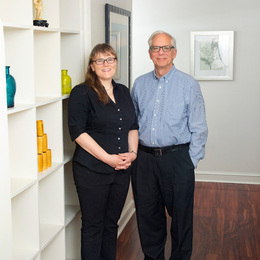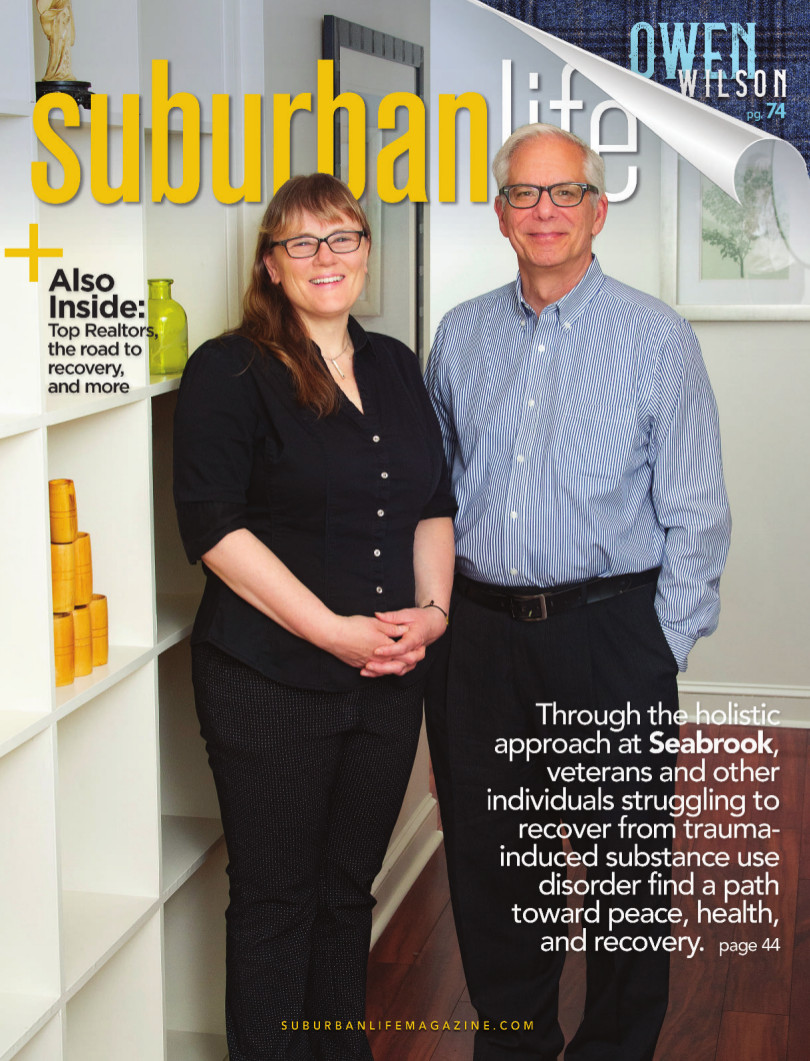
Hope on the Horizon
Through the holistic approach at Seabrook, veterans and other individuals struggling to recover from trauma-induced substance use disorder find a path toward peace, health, and recovery.
Substance use disorder (SUD) refers broadly to any recurrent use of alcohol and/or drugs causing major impairment to a person’s health and life function. While the term may be unfamiliar to some, SUD hits far too close to home for a shockingly high number of American families.
“The rate of overdose deaths in the U.S. rose from 70,000 to 90,000 just in the last year,” says David Russo, M.D., FACS, Medical Director for Seabrook, a provider of addiction treatment services with five locations throughout New Jersey. “The death rate for opioid use is going through the roof, so clearly this is a medical problem.”
Veterans in particular face unique challenges related to SUD, according to Katie R. Ross, Director of Veterans Services for Summit Behavioral Healthcare, of which Seabrook is a member.
“A lot of people have trauma, but this is a different kind,” she says. “Co-occurring chronic pain in the military population appears often, and it’s hard for a person to have hope when they’re in constant pain. Teaching healthy ways to manage pain, including holistic alternatives, while helping someone get sober and treating mental health challenges helps someone say, ‘I’m going to be able to do this.’”
Facilities such as Seabrook play a vital role in helping these individuals heal, recover, and move forward with their lives. Ross helped develop and oversee the Tactical Recovery Program used at facilities such as Seabrook, which has partnered with the Department of Veteran Affairs as a member of the VA Community Care Network. From her perspective, individualized treatment lies at the heart of each veteran’s journey to recovery.
“Even if a person hasn’t had combat experience, there are cultural aspects such as an ingrained sense of service that need to be understood,” she says. “Everyone who served post-9/11 volunteered with the knowledge that they may be called on to give the ultimate sacrifice. There’s so much uniqueness to the culture of loyalty, focus on mission, and the importance of the larger group.”
Summit BHC established a curriculum to become certified as a Veteran-Ready Healthcare Organization, according to Ross. A Summit BHC team collaborated with PsychArmor, a nonprofit organization dedicated to improving health and life outcomes for military-connected individuals, to create training modules for all staff, from those who provide direct care to those in support roles. Every member of the team, from administrators and clinical care providers to housekeeping and culinary staff, was educated on how best to serve veterans’ needs.
“This is all with the goal of making veterans feel comfortable and that they are with people who have some understanding of their experiences,” Ross adds. “The next layer is using a specific treatment intervention selected directly from evidence-based modalities that have had success in the veteran population. Bringing that altogether from daily human interaction to clinical work, we tailor programs uniquely for this population.”
Restoring Balance
Seabrook’s clinical approach blends Eastern and Western medicine. Dr. Russo refers to members of the clinical staff on both sides of the coin as “the backbone of our treatment center.” Adriane Dourte, DAOM, stands among them. Dr. Dourte, who has been with Seabrook for six years, holds a doctorate in acupuncture and Chinese medicine through Pacific College of Oriental Medicine. Her areas of expertise include acupuncture, massage, yoga, tai chi, nutrition, herbal medicine, and qigong, a system of coordinated body postures accompanying breathing and meditation designed to manifest energy in the body.
Seabrook’s clinical approach blends Eastern and Western medicine. Dr. Russo refers to members of the clinical staff on both sides of the coin as “the backbone of our treatment center.” Adriane Dourte, DAOM, stands among them. Dr. Dourte, who has been with Seabrook for six years, holds a doctorate in acupuncture and Chinese medicine through Pacific College of Oriental Medicine. Her areas of expertise include acupuncture, massage, yoga, tai chi, nutrition, herbal medicine, and qigong, a system of coordinated body postures accompanying breathing and meditation designed to manifest energy in the body.
“There is a good bit of research about how acupuncture can help with addiction and PTSD [posttraumatic stress disorder],” shares Dr. Dourte. “Ultimately, acupuncture and Chinese medicine focus on restoring balance to the body. This means reconnecting the mind and body, and restoring balance between emotional and physical aspects.
“In Chinese medicine, the focus is also on the individual person,” she continues. “There is no ‘one size fits all’ approach. There is not just one point on the body to address back pain. We mix Eastern and Western medicine, medically managing patients while incorporating wellness components. We also have a dietary staff focused on nutrition.”
Movement and exercise are essential to one’s recovery. Seabrook’s Bridgeton facility offers a full gym and cardio room staffed by a personal trainer with a degree in exercise science. Outdoor facilities include two basketball courts, full softball and volleyball fields, a low-ropes course, a track, and a labyrinth where patients can walk or meditate.
“As far as the grounds go, it’s a beautiful setting,” Dr. Russo says. “It’s a very serene area with trees and well-kept facilities. It’s a pretty place, which helps make people comfortable, and our multidisciplinary approach allows us to address whatever specific needs someone has, from dietary to psychiatric. We try to cover all the bases.”
“All the bases” includes an established network so patients can stay connected long after they have entered recovery. A robust alumni program enables former residents to keep in touch with their peers and care providers. Seabrook also offers a smartphone app that can help individuals track their recovery, as well as post milestones and send feedback to Seabrook regarding their experiences.
Whether it’s a military veteran just back from a warzone or a civilian dealing with the lingering effects of childhood trauma, Seabrook has the same goal for anyone seeking help for SUD: to help them realize there is not only hope for a better life, but also a clear path forward.
“Recovery doesn’t happen if there’s no hope for that person,” Ross adds. “There’s a reason someone self-medicates, and treatment is painful. Once a solid plan is identified, that’s where hope builds. Patients need to have the hope that working through these things is going to bring them ultimate peace, health, and recovery.”
For more information on Seabrook and its locations throughout New Jersey, call (800) 761-7575 or visit seabrook.org.
Photograph by Alison Dunlap
Published (and copyrighted) in Suburban Life magazine, March 2022.



